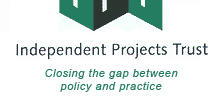
Independent Projects Trust
Turning the
Tide on Crime
A breakfast briefing presented at the Royal Hotel, Durban on the 13th November 2003.The purpose of this event was to provide an opportunity for individuals within the various departments of the Criminal Justice System to share some of their success stories. Here are the highlights of the various presentations:
Val Melis is head of the Family Matters Section at the Durban magistrates court. Val is responsible for courts that deal with the criminal prosecution of maintenance defaulters, juvenile courts, courts dealing with child abuse and domestic violence. They have been able to complete a remarkable amount over the last few years, for example:
- In the maintenance courts the number of outstanding cases has been reduced from 360 to 18 in three years.
- In the Juvenile Court 837 cases have been finalised this year and there were 629 diversions.
- With regard to Domestic Violence cases 227 have been finalised.
- 141 child abuse cases have been finalised in the regional court and 165 children have passed through the court system.
Clifford Marion from the Directorate of Special Operations (Scorpions) in KZN said: The DSO mandate is to investigate and prosecute individuals who organise crime and profit from it. The DSO intervenes in crime markets that have the greatest economic, social or security impact on the citizens and the state of South Africa.
Key strategic areas are: Organised crime e.g. drug trafficking, organised violence; organised corruption; serious and complex financial crime e.g. market manipulation, insider trading, reckless trading, induced liquidation; POCA related offences, racketeering, money laundering, gangs and AFU.
The DSO has completed 653 cases, comprising of 273 investigations and 380 prosecutions, since its legislative inception on 12 January 2001. Of these, 380 investigations have resulted in finalised prosecutions and 349 thereof in convictions. This translates into an average conviction rate of 93,1%. 588 cases (investigations and prosecutions) are still ongoing.
A preliminary overview of operational activities for April to October 2003 has highlighted the following:
- 98 investigation-projects are being conducted in the focus areas
- 109 old investigations have been finalised
- 107 prosecutions have been concluded, with 27 high impact ones in the strategic focus areas
- The current conviction rate remains above 90%
- Cases in which an equivalent of R90 million in asset forfeiture stand to be generated are on the cards
- 180 instances of arrests, searches, interceptions and entrapments, and 39 electronic/physical surveillance have been conducted.
Specific operational highlights include the following:
- Project Guanxi is a national project focusing on the activities of the East-Asian criminal groupings operating in South Africa. On the KZN leg of Project Guanxi, allegations of dealing in counterfeit cigarettes to the value of R10 million were investigated. The investigations in the Western Cape region concentrated on the activities of the Chinese who, apart from being buyers of almost all illegally harvested abalone, are also the main providers of drugs (mandrax) to the region, often by means of an exchange deal. 38 arrested persons are currently before the Regional Court. Guanxi has until recently produced 73 arrests, 19 convictions, asset restraint orders valued at R34.5 million and a contraband yield of R65.2 million.
- Four terms of life imprisonment imposed in May 2003 on the henchmen of R. Ngubo have gone some way to reducing political violence in the KZN Midlands.
- 17 convictions realised out of the progressive use of plea bargaining in Durban have bolstered the image of the RAF in dealing with internal corruption.
Our third speaker was Barney Dreyer of Operation West, a multi-disciplinary team which targets criminal syndicates and the buildings from which they operate.
They work closely with Asset Forfeiture and have had a number of successes there, and also with the Electricity Department and Department of Labour. They have been instrumental in getting a number of buildings condemned and have cleared others of West African nationals, and ensure that the buildings are cleaned up and upgraded.
They have seized more than R18 million worth of drugs since their inception about 18 months ago and have arrested 797 people. They have a 97% conviction rate for the cases that have been finalised so far. And they have only 20 members.
Barney provided quite a frightening overview of the drug scene in Durban:
- The total estimated annual turnover for the sale of narcotics in the Point area alone amounts to about R1,4 billion.
- Since 1990 the drug trade in SA has escalated by 70%.
- West African nationals are responsible for 80% of all drug trafficking in Durban.
- 100% of the drug trade in the Point area is controlled by West African nationals.
Our final speaker, Senior Public Prosecutor Mark Dyson, was instrumental in setting up a drug court in Durban after attending a United Nations seminar. Before the court was established at the beginning of this year, drug related cases were treated in the same manner as other criminal matters and in the same courts. The cases are now dealt with in a single court by a specialist prosecutor and magistrate.
The court works closely with specialist police units and with detectives to ensure that investigations are prosecutor driven. In addition, a close relationship with the Asset Forfeiture Unit has resulted in the seizure of buses, cars, houses and a farm.
In addition, Mark spoke to the forensic lab where drugs are analysed to find out about the process. At that stage cases were being remanded for three or four months for an analysis that only took a few days. As a result of the contact between Mark and the lab, this remand period has been reduced to six weeks.
Dyson told the briefing: "We have made inroads into every level of syndicates and drug trafficking from the street peddlers to the drug lords. In fact, the court has developed a formidable reputation in the drug industry and we are told that dealers are nervous of appearing in our court."
In the first 10 months that the court has been operating (it started at the beginning of this year) it has finalised more than 1000 cases -- "probably more than any other court in the country". It is one of about 10 district courts in the Durban area and finalises more than half of the total number of cases completed in those courts. It also has a 96% conviction rate.
For further information about this briefing or our crime prevention project please contact info@ipt.co.za


